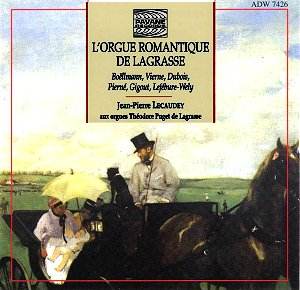|
|
Search MusicWeb Here |
|
 |
||
|
Founder:
Len Mullenger (1942-2025) Editor
in Chief:John Quinn
|
|
|
Search MusicWeb Here |
|
 |
||
|
Founder:
Len Mullenger (1942-2025) Editor
in Chief:John Quinn
|
 |
L’ORGUE ROMANTIQUE DE
LAGRASSE Leon BOËLLMANN (1862-1897) Suite Gothique op 25 Louis VIERNE (1870-1937) Adagio (op 28 no 4); Berceuse (op 31 no 19) Théodore DUBOIS (1837-1924) Toccata Gabriel PIERNÉ (1863-1937) Trois Pièces op 29: Prélude, Cantilène, Scherzando Eugène GIGOUT (1844-1925) Toccata in B minor Louis LEFÉBURE-WELY (1817-1869) Sortie in B flat major; Elevation; Communion; Sortie in E flat major Recorded at St Michel de Lagrasse, nr Carcassonne, France, October 1998 |
| CD available for post-free online mail-order or you may download individual tracks. For some labels you can download the entire CD with a single click and make HUGE savings. The price you see is the price you pay! The full booklet notes are available on-line. | |
|
NOTE • Click on the button and you can buy the disc or read the booklet details • You can also access each track which you may then sample or down load. • Further Information. |
|
|
This is yet another most interesting organ recital by Jean-Pierre Lecaudey. I have praised his musicianship and virtuosity in previous reviews, and these virtues – together with his evidently deep knowledge of the organ repertoire and especially the work of the French schools of the 19th and 20th centuries – may be taken for granted.
Another reason for welcoming any Lecaudey recital is that each is performed on a different, carefully chosen instrument. Here it is the Puget organ at Lagrasse in Southern France. Built in 1852 for a church in nearby Carcassonne, it was relocated in Lagrasse in 1883, where later it underwent some modifications. In 1996, it was restored by Jean Daldasso to its original state, except that he extended the pedal board from 25 to 30 notes. For its size – it has only two manuals – it is a remarkably versatile and powerful instrument. It is well equipped with typically fiery French reeds, but unusually has only a solitary mutation stop (the Great Plein-jeu) – for which relief, much thanks!
The programme is nicely diversified. Of the familiar items, I particularly enjoyed Vierne’s Berceuse in a characteristically affectionate reading, and the exuberant Toccata by Dubois, a fine vehicle for this modest instrument’s vitality and unexpected power (Sample 1). But chief interest lies in two very different composers – Pierné and Lefébure-Wely It’s so long since I heard Pierné’s once very familiar Entry of the Little Fauns – the only piece to keep his name alive – that I’ve forgotten how it goes. His Trois Pièces, new to me, show that he was a composer of considerable stature. He held important organ posts in Paris (he succeeded César Franck at St Clothilde), but somewhat unusually, as Lecaudey points out, these pieces are conceived in pianistic terms: listen, for instance, to the rippling Prélude (Sample 2) and similar figurations in the Cantilène. The concluding Scherzando is a engagingly playful romp, topped off by a mildly grandiose coda.
Louis-James-Alfred Lefébure-Wely is not entirely forgotten – with a name like that, how could he be? But the compilers of modern reference books have long ceased to consider him worthy of inclusion. In another illuminating programme-note Lecaudey is rightly perplexed by the fact that Lefébure-Wely was highly esteemed by, amongst others, Saint-Saëns and Liszt. He was apparently a brilliant improviser and pulled in the crowds first to the Madeleine and later St Sulpice. The two central pieces on this disc are conventionally devotional if melodically uninspired, but the two Sorties (Sample 3) are another matter: outrageously vulgar and frivolous in style (irresistibly recalling old-fashioned fairground organs) and thematically banal (but with some clever harmonic shifts). The clergy, notes Lecaudey, did not disapprove: large crowds meant bulging collection-plates; and, as the priest at the Madeleine observed, these people frequented the Opéra-Comique and it would not do to disturb their musical tastes . . . I have to admit that they are rather fun!
A splendid disc. One grumble – Pavane really ought to take more trouble over the quality of their English translations. For instance, I think I know what the following means, but I shouldn’t have to resort to guesswork: ‘ . . . Saint-Saëns, who complained that having exposed the four parts of a Bach fugue for a performance, there wasn’t one member of the congregation left in the church . . .’ Adrian Smith
|
| ADDITIONAL INFORMATION •
You can sample only 30 seconds (or 15% if that is longer) of a given track. Select from the View tracks list. Each sample will normally start from the beginning but you can drag the slider to any position before pressing play. • PLEASE NOTE: If you are behind a firewall and the sound is prematurely terminated you may need to register Ludwig as a trusted source with your firewall software.
•You will need Quicktime to hear sound samples. Get a free Quicktime download here • If you cannot see the "Sample All Tracks" button you need to download Flash from here.
|
|
|
Return to Index |